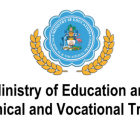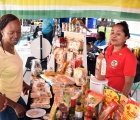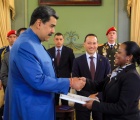NASSAU, The Bahamas — The Bahamas Postal Service released five special Independence Commemorative Stamps, Monday, July 8, 2013. The 15 cent value highlights the delegation that attended The Bahamas Independence Conference held at Marlborough House in London, England from December 12 -20, 1972. Representing The Bahamas at that conference was Lynden Pindling, leading the government delegation comprising of Arthur D. Hanna, Milo Butler, Carlton Francis, Clement Maynard, Paul Adderley, George A. Smith, Loftus Roker, Philip Bethel, Cadwell Armbrister and Henry Bowen. Kendal G. L. Isaacs led the Opposition delegation, which also included Arthur Foulkes, Orville Turnquest and Norman Solomon. The Under Secretary of State for Foreign and Commonwealth Affairs, Lord Balniel, led the British delegation and chaired the Conference. After days of discussion and exchange of views a constitution had been agreed. The new constitution provided the legal framework for a new Bahamas and included, inter alia, entrenched provisions for the protection of the fundamental rights and freedoms of the individual, citizenship, the Parliament, the Executive, the Judiciary and the Public Service.

The 25 cent value depicts the first Bahamian Governor General of The Bahamas His Excellency Sir Milo Boughton Butler GCMG, GCVO, sworn in on August 7, 1973.

The 50 cent value depicts one of the longest serving heads of Government in the Commonwealth, the Rt. Hon. Sir Lynden Pindling. KCMG served as Prime Minister of The Bahamas for 25 years, during which time he led the country to Independence from Great Britain on July 10, 1973. Additionally, he served as a Member of the House of Assembly for 41 consecutive years.

The 65 cent value illustrates the incident where the Royal Bahamas Defence Force 103ft. patrol vessel HMBS Flamingo, left the Coral Harbour Base on what should have been a routine 10-day patrol of Bahamian territorial waters to stem poaching, Thursday, May 8, 1980. Two days later, two fishing vessels were spotted and attempted to flee as the Flamingo approached. When the marines boarded they found four Cuban crewmen on each vessel and a large quantity of fish. They took the vessels into tow to the nearest cay for a more thorough search. However, two Cuban MIGs arrived and buzzed and strafed HMBS Flamingo, despite the flying of The Bahamas flag in Bahamas territorial waters. Hit by rocks and machine gun fire, the Flamingo began to take on water and burst into flames. While the officers tried to swim to safety, the Cuban jets returned, strafing the surrounding waters and tearing apart the two lifeboats that had been jettisoned overboard. All except four of the 19 crewmen made it to one of the fishing boats and despite extensive searching the missing marines – Fenrick Sturrup, David Tucker, Edward Williams and Austin Smith – were never found.After a few more harrowing events, the Cubans initially claimed that the Flamingo had been mistaken for a “parrot ship,” but this was not accepted and the immediate concern was to continue the search for the missing men. Weeks of diplomacy ensued and the Cubans finally accepted full responsibility for the attack, paid compensation to the families of the dead marines and made repatriations for the ship and her supplies. The eight Cuban poachers, who started it all, paid $90,000 in fines.

The 70 cent value depicts the three Bahamian Rhodes Scholars – Christian Campbell, Desirée Cox and Myron Rolle. The Rhodes Scholarships are the oldest and most celebrated international fellowship awards in the world. Rhodes Scholars are chosen not only for their outstanding scholarly achievements, but also for their character, commitment to others and to the common good and for their potential for leadership in whatever domains their careers may lead.





